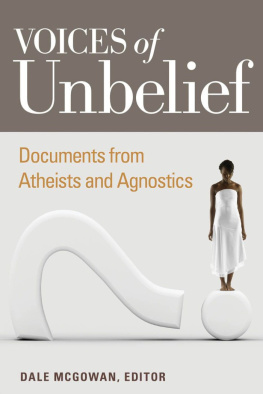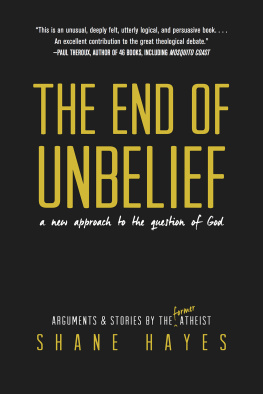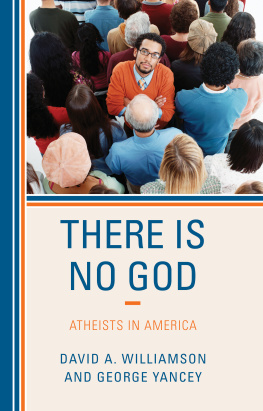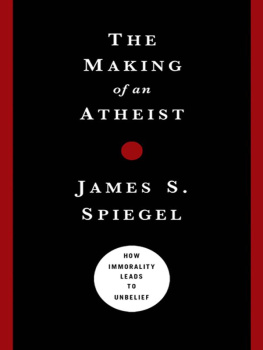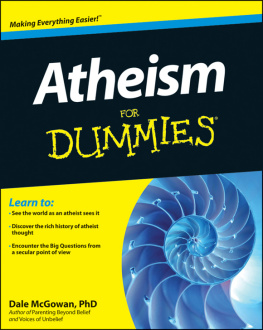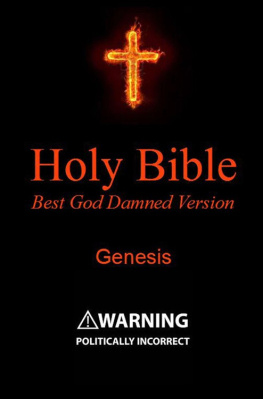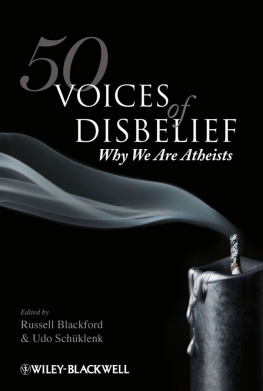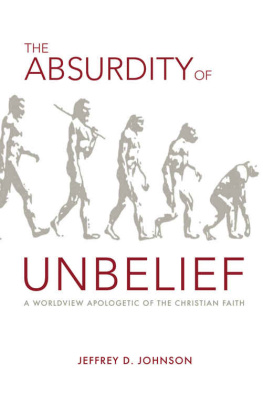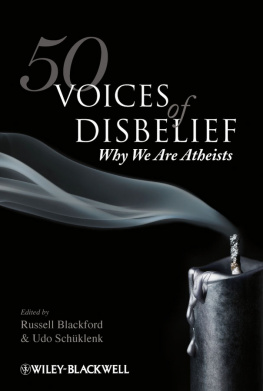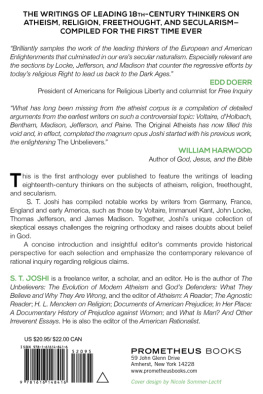Voices of Unbelief
Documents from Atheists and Agnostics
Dale McGowan

Copyright 2012 by ABC-CLIO, LLC
All rights reserved. No part of this publication may be reproduced, stored in a retrieval system, or transmitted, in any form or by any means, electronic, mechanical, photocopying, recording, or otherwise, except for the inclusion of brief quotations in a review, without prior permission in writing from the publisher.
Library of Congress Cataloging-in-Publication Data
Voices of unbelief : documents from atheists and agnostics / Dale McGowan, editor.
p. cm.
Includes bibliographical references (p. ) and index.
ISBN 9781598849783 (hardcopy : alk. paper) ISBN 9781598849790 (ebook)
1. AtheismHistorySources. 2. AgnosticismHistorySources. 3. Faith. I. McGowan, Dale.
BL2747.3.V59 2012
211.8dc23 2012018238
ISBN: 9781598849783
EISBN: 9781598849790
16 15 14 13 12 1 2 3 4 5
This book is also available on the World Wide Web as an eBook.
Visit www.abc-clio.com for details.
ABC-CLIO, LLC
130 Cremona Drive, P.O. Box 1911
Santa Barbara, California 93116-1911
This book is printed on acid-free paper 
Manufactured in the United States of America
Contents
Documents
Acknowledgments
My sincere thanks must begin with Hemant Mehta and Amanda Metskas, each of whom played a part in sending this engaging project my way.
The staff at ABC-CLIO have been a pleasure and privilege to work with, including Michael Wilt, George Butler, and Erin Ryan. Thanks as well to Magendra Varman at PreMediaGlobal and to Deborah Bader for brilliant proofingincluding the single best catch Ive ever seen.
Cliff Walker at Positive Atheism and Emmett Fields at the Bank of Wisdom are among the unsung heroes of freethought. Their patient efforts to make key writings by atheists and agnostics publicly available and searchable have been invaluable to me in this and other projects. Other important resources include the Investigating Atheism project of the University of Cambridge and Oxford Bibliographies Online.
I am grateful to Thomas Lawson, whose book Letters from an Atheist Nation brought to my attention Charles Chilton Moore of the Blue Grass Blade and his extraordinary Why I Am an Atheist project of 1903; also to the Chronicling America project of the National Endowment for the Humanities and the Library of Congress, which is preserving American history through the digitizing of daily newspapers. This is just one of countless cultural and historical contributions by the NEH.
I am indebted to David Joyce and Charles Blinderman of Clark University in Vancouver, Washington, whose Huxley Project online was the first to bring T. H. Huxleys correspondence to my attention, as well as Vipan Chandra of Wheaton College (Massachusetts) for helping me locate the source of a crucial Jain text.
The work of several scholars has been especially important in the production of this book, including Alan Charles Kors for research into French atheism in the 17th and 18th centuries; Tullio Gregory for work on the pre-Enlightenment clandestine manuscripts; Emmanuel Le Roy Ladurie for his seminal microhistory of 14th-century Montaillou ; Sarah Stroumsa for her unique contribution to our understanding of freethought in medieval Islam; and Annie Laurie Gaylor for Women Without Superstition , the definition study of the intersection of feminism and freethought.
The influence of Jennifer Michael Hechts brilliant book Doubt: A History on this project and on many other freethought works in recent years is inestimable.
Thank you as well to Brian Keith Dalton, Alice Walker, Richard Dawkins, Alan Tacca, and Sikivu Hutchinson for their personal assistance in bringing their works into this collection, and to Beth Lamont, a bright light in humanism, for permission to use her late husbands work.
Only a few sections of the 14th-century Fournier Register, a uniquely fascinating historical document, have ever been translated into English. I had the good fortune to work with translator Dareth Pray, who under the supervision of Professor Nancy Stork at San Jose State University had translated the precise Fournier interrogations I needed. I am indebted to both of them, as well as Anastasia Makeeva and Tony Patricolo for help in translating the Occitan prayers.
Thanks to the staff at the Georgia State University Library and Kennesaw State University Library for assistance in locating key research materials.
Finally, all thanks and love to my wife, Becca, and my children, Connor, Erin, and Delaney, for support and encouragement during this long and complex project.
Introduction
Belief and Unbelief
Belief in the existence of a supernatural deity is found in every human culture, time, and place. Archaeological evidence over 130,000 years old testifies to the presence of the compelling idea that an unseen forceusually in the form of a god or godsis responsible for the creation, operation, and ultimate fate of the world around us.
Over the course of 10,000 human generations, this hypothesis has fractured into countless distinct religious traditions. Any attempt to map these diverse beliefs geographicallylabeling this country Christian, another Islamic, and yet another Hindu, for examplegives the false impression that all individuals in a given place and time answer the big questions in the same way, something that is never fully accurate.
If instead we listen carefully to the disparate voices in any culture, a much more interesting picture emerges. In addition to orthodox believers in the majority religion, there will always be dissenting voices within that religion (sometimes called heretics), adherents of minority religions, religious doubters, those who say the answers are simply unknowable (agnostics), and some who reject belief in gods entirely (atheists).
Though atheism and agnosticism are most evident in modern times, every religious hypothesis advanced in history and prehistory, back to the earliest evidence of religious observance in Neanderthal sites over 130,000 years old, was almost certainly met with doubt or outright unbelief in at least some listeners. Whether these dissenting opinions were then voiced aloud, recorded in some form, and passed down to subsequent generations is a question that will recur throughout this book. Fortunately, there are enough whispers, even from corners of history dominated by religious perspectives, to allow us to hear voices of unbelief in every era for which written records are available. It is the purpose of this book to draw out those voices, presenting as full as possible a picture of this fascinating thread of human thoughtthe rejection of supernatural explanations for the world around us.
What Is Atheism?
In the broadest terms, atheism (from the Greek atheos , without god) is the lack of belief in the existence of a supernatural deity or deities. As will become evident throughout this book, it is difficult to make further generalizations beyond this single characteristic. Some atheists are strictly secular, for example, avoiding not only belief in the supernatural but all spiritual or religious practice as well. Others, including Jains, Wiccans, and many Buddhists, observe religious and spiritual practices nontheisticallywithout the framing concept of a supernatural being.
Atheist in ancient Greek was an epithet used by ones opponents or accusers, especially in cases of perceived impiety or lack of proper reverence toward the divine. Socrates, whose impertinent questions challenged the religious and political norms of his day, was called atheos , even though he stated clearly that he believed in godsjust not those recognized in his time and place.
Next page
